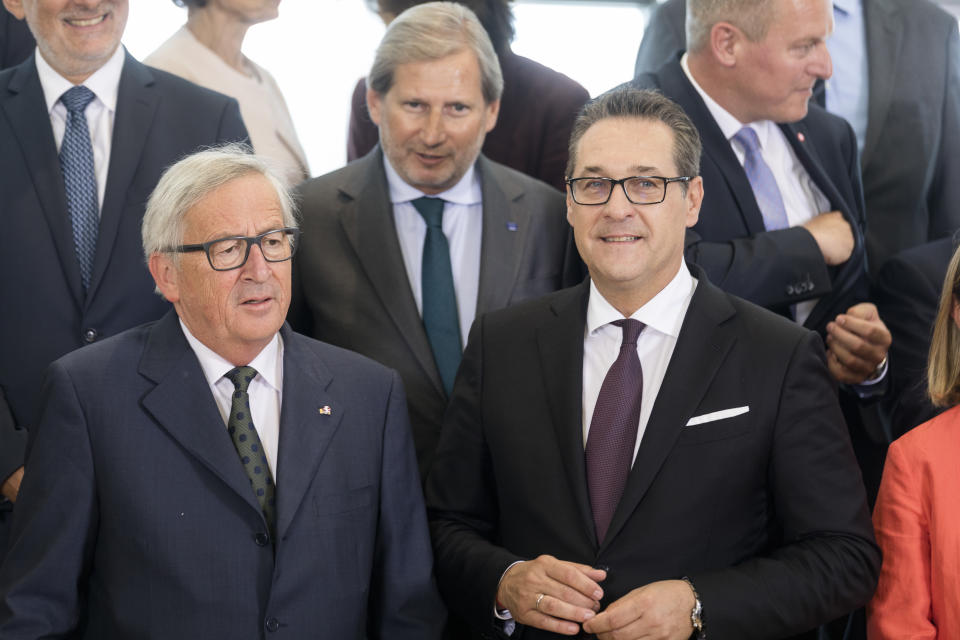Pro-Brexit politicians among ministers now leading the EU Council

The European Council will be led from today by an Austrian government whose second most senior minister congratulated British voters on deciding to leave the EU.
Austrian ministers will lead the Council – made up the leaders of the 28-member states – over the most crucial period of the Brexit process.
They will chair the October summit at which a Brexit deal is supposed to be signed-off and organise nine other Brexit-related meetings before then.
The country’s official programme for their six-month presidency states they want to “maintain the unity of the EU 27” throughout the process.
MORE: Theresa May’s latest Brexit proposal binned by Brussels as party division deepen
And Austrian chancellor Sebastian Kurz, who will address the European Parliament on Tuesday, has said Brexit will have “negative effects” on Britain and the EU.
But senior ministers in his coalition government from the far-right Freedom Party have spoken out in support of Brexit and criticised the EU’s handling of the issue.
Austrian vice-chancellor Heinz-Christian Strache welcomed the Brexit vote in a statement posted on social media the day after the referendum.

“Brexit sets the course for democracy against EU centralism and migration mania,” it said.
“We congratulate the British on their regained sovereignty. The result of yesterday’s referendum is a legitimate outcry of democracy.”
He also wrote that EU reform was not possible while Jean-Claude Juncker was head of the European Commission.
Ahead of last year’s Austrian general election, Strache predicted Britain would be “better off” outside the EU.
Strache, along with Kurz, is due to welcome Juncker and his Commissioners to Vienna on Friday as part of a series of events to mark the start of the Austrian presidency.
Norbert Hofer, Austrian transport minister, also expressed delight about the Brexit vote at the time of the referendum, declaring the result in capital letters and later calling it an “exciting night.”
#Brexit UK VOTES TO LEAVE! Wir werden erst in den nächsten Tagen die volle Tragweite dieser Entscheidung erkennen.
— Norbert Hofer (@norbertghofer) June 24, 2016
Karin Kneissl, Austria’s minister for Europe and foreign affairs, was also highly critical of Juncker following the Brexit referendum, branding him “loutish” and “arrogant.”
“He acts as if he was Brussels’ Caesar,” she wrote in Austria’s Kronenzeitung newspaper in July 2016.
Kneissl was nominated for the post by the Freedom Party, which sits in the same European Parliament group as the French National Front and Brexit-supporting MEP for South East England, Janice Atkinson.
The prospect of a government with Brexit-friendly figures taking a leading role in the EU’s work at a crucial moment in the process may concern the EU.
Fabian Zuleeg, chief executive of the European Policy Centre, said: “It’s awkward for the EU to have the Freedom Party there for a number of reasons. A number of people are not happy.”
MORE: ‘Huge and serious’ differences remain in Brexit talks
However, there are signs the politicians have been tempered by being in government.
After meeting EU chief Brexit negotiator Michel Barnier last month, Kneissl said it is important EU member states “speak as one” on the issue.
Hofer distanced himself Brexit during his failed bid to become Austrian president in 2016 and Strache has gone silent on the issue more recently.
“When you look at what some of these populists have said, they were vocal just after the referendum but later on they stopped talking about,” explained Zuleeg.
“There’s a reason for that: no one at the moment in any party wants to be associated with something which is so obviously going wrong.”

 Yahoo Finance
Yahoo Finance 